Technology brings rural Tibetans closer to modern world
Updated: 2021-08-19 By Zhang Yangfei (China Daily)  Print
Print 


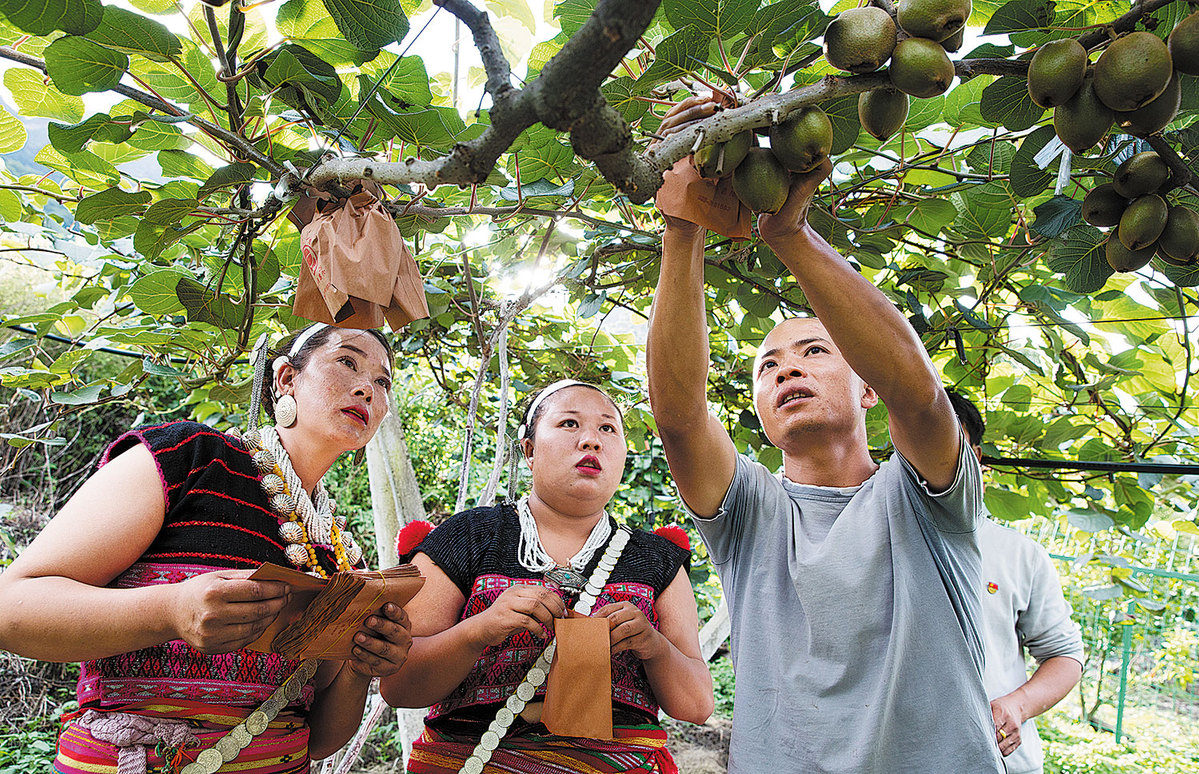
A marketing professional shows residents of Zayul county how to bag the kiwi fruit they grow. The approach helps guarantee the quality, appearance and competitiveness of the products. [Photo by JIN LIWANG/XINHUA]
Livestreaming and digital platforms are helping to raise living standards in isolated communities. Zhang Yangfei reports from Lhasa.
Tsowang Drolma adjusted her smartphone on a tripod, then sat down in front of it holding a bag of finger millet and began livestreaming from her home.
She is the only university graduate living in Thaling, a village in Zayul county, Tibet autonomous region.
After graduating from Xizang Minzu University in Shaanxi province with a bachelor's in Chinese language and literature, she returned to her hometown in 2019, hoping to use the knowledge and experience she had gained in higher education to bring greater prosperity to her village peers.
Since last year, the 26-year-old has been using online sales via digital platforms to promote agricultural produce grown deep in the local mountains to people across China.
By last month, she had earned 80,000 yuan ($12,340), which prompted more households to join her business venture.
"To boost your income, you have to open your mind. That's what I often tell the villagers," she said.
Thanks to people like Tsowang Drolma, farmers and herders in Zayul have started exploring ways to improve their incomes, which has contributed to the county's rapid economic development in recent years.
According to county government statistics, GDP reached 1 billion yuan last year, a rise of 6.8 percent from 2019, while per capita disposable income was 15,600 yuan, up 36 percent from the previous year.
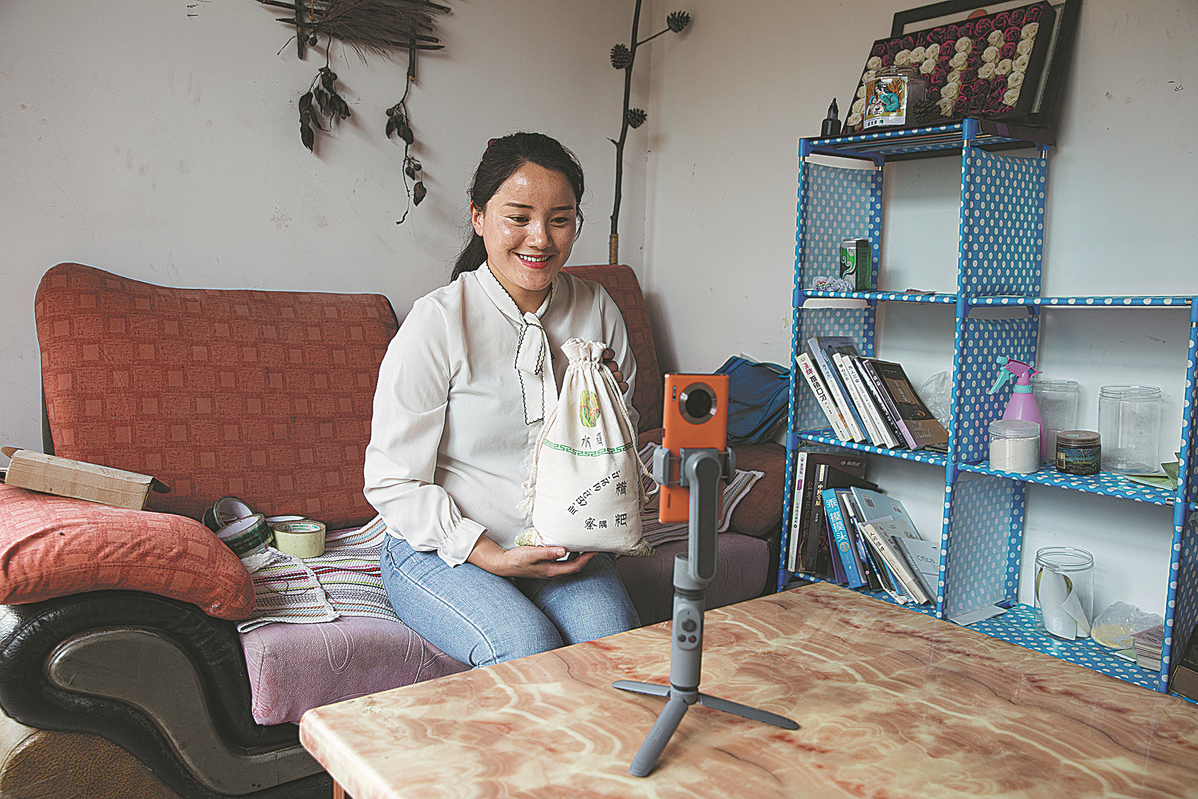
Tsowang Drolma sells local products via a livestream at her home in the county. [Photo by JIN LIWANG/XINHUA]
The county, which is located in the southeast of the region, close to the border with India, is home to 10 ethnic groups.
Unlike most parts of Tibet, which are situated high on the plateau, Zayul is surrounded by mountains and valleys and has an average altitude of less than 3,000 meters.
Thaling lies at about 1,000 meters. Its relatively low elevation means the village has abundant rainfall, a mild climate and rich forest resources, which are conducive to the cultivation of many crops.
However, the mountainous terrain used to pose problems in terms of transportation, which severely hampered local development.
Today, the village has asphalt roads that facilitate its connection with other areas and also assist local produce, such as finger millet, a cereal crop unique to the area, and Tibetan incense.
The village is a microcosm of Tibet's recent development. Across the region, villagers have explored ways to raise incomes and living standards. They relocated from unfavorable places, tapped into their strengths, brought in professional advisers, set up cooperatives and developed rural tourism.
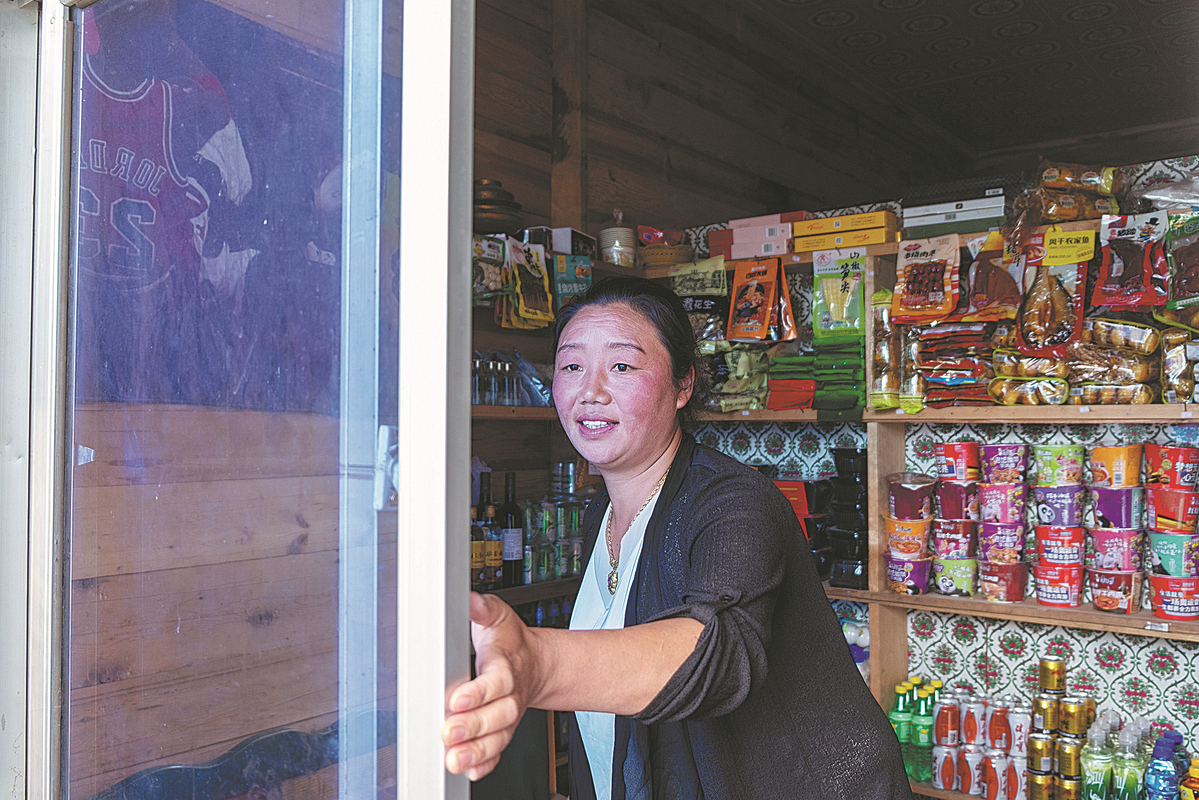
A shopkeeper stands in her store in Zayul in May. [Photo by JIANG FEIBO/CHINA NEWS SERVICE]
Strong support
This year marks the 70th anniversary of Tibet's liberation. On May 23, 1951, the central government, then still in its infancy, signed an agreement with Tibet's local government that helped the people break free of the fetters of the aristocracy for good.
In 1959, the government carried out democratic reform and abolished the feudal system, giving all Tibetans equal status.
Since then, the region's socioeconomic development has speeded up thanks to strong support from the central government.
For Tsowang Drolma, changing people's mindsets was the key to development. In the past, Thaling's residents only knew how to farm, and they consumed all the crops they grew themselves, she said.
She added that when she began her online sales business, she found it hard to explain the enterprise to the villagers.
"They just couldn't be bothered to change their way of life," she said.
In 2019, when Tsowang Drolma returned home, she was appointed the village's "rural vitalization specialist" and quickly discovered that it lacked a collective economy.
After conducting research, she understood the unique selling points of many local products. In addition to the special finger millet, the tsampa made in Zayul from roasted Qingke barley flour has a sweet taste not found if the dish is made from other types of flour. It is also a traditional treatment for diarrhea in children.
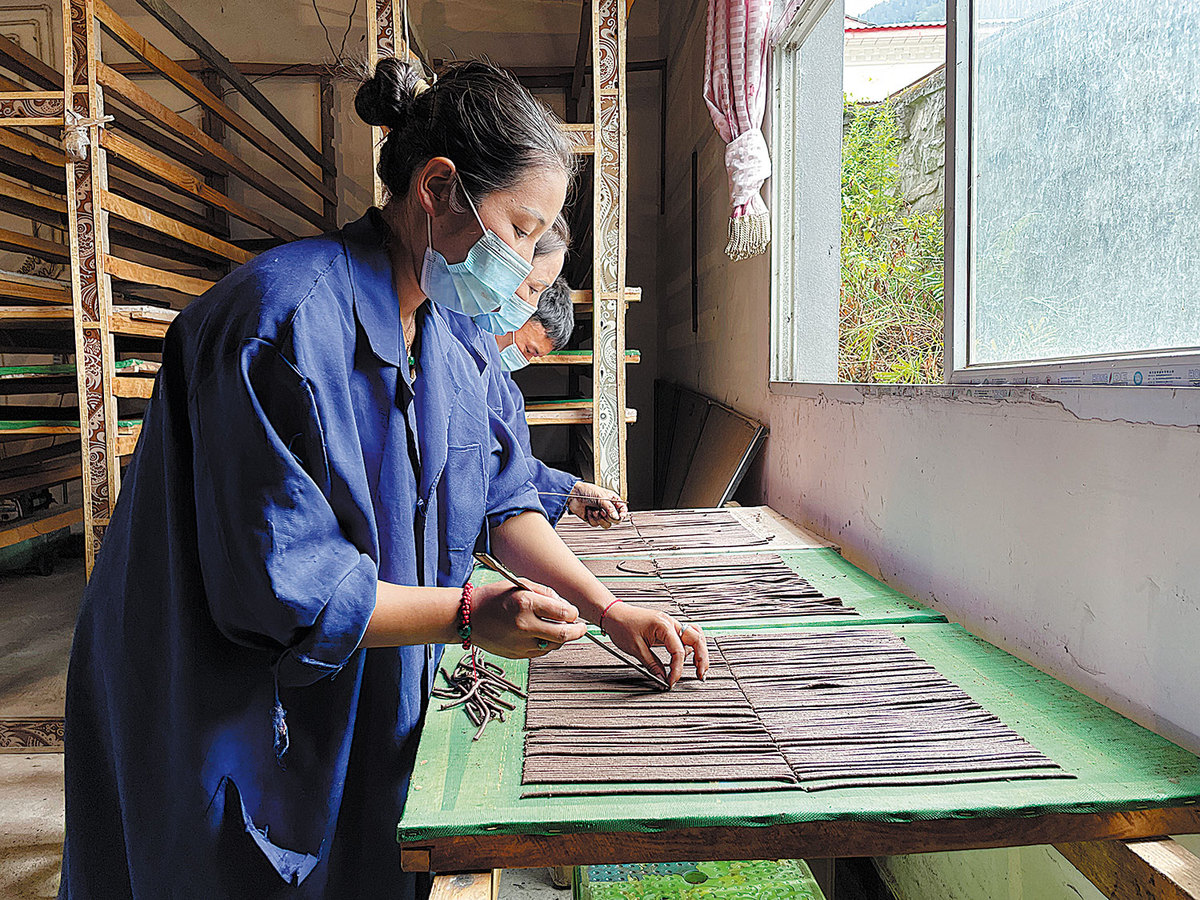
Workers sort sticks of Tibetan incense at a factory operated by a cooperative in the village. [Photo by ZHANG YANGFEI/CHINA DAILY]
The local jiuniang, or sweet rice wine, made from fermented glutinous rice, is brewed with yak butter and honey and is very nutritious.
"I figured my hometown has so many good things that I should let more people know about them," Tsowang Drolma said.
She registered a trademark, designed a logo for the products, collected the goods from households after the harvest, packaged them and sold them via WeChat and Douyin, a short-video platform known in the West as TikTok.
When the local people saw how much money she was making, many decided to join her business, so she took the opportunity to teach them how to run the operation.
She also used every village conference to stress the importance of being open to new ideas. Under her guidance, some villagers started teahouses and small stores, while others obtained loans so they could buy excavators.
"Now, they are really willing to take the initiative to find more work," she said.

A tourist enjoys a view of peach blossoms in Nyingchi city in March. [Photo by SUN RUIBO/XINHUA]
Sweet smell of success
The digital channels Tsowang Drolma introduced have broadened access to customers for Tsering Wangdrak, who runs a business that makes Tibetan incense.
To the villagers, the 39-year-old is renowned as "the first local man to travel to Lhasa" and "a leader in entrepreneurship".
In 2014, Tsering Wangdrak raised more than 300,000 yuan by his own efforts and set up a cooperative to manufacture traditional incense.
Since then, he has encouraged eight households to join him. His business has not only created jobs and brought prosperity to the village, but also significantly lowered the price of Tibetan incense.
Before, the county's remote location and the heavy reliance on imported goods had made the product extremely expensive for the villagers.
The incense, which contains more than 30 natural herbs and spices, including sandalwood, narra, agarwood and cloves, is widely used for cleansing the air, as an aid to relaxation and meditation, and as a preventive against flu. As such, it is widely used in living rooms, public places and monasteries.
When he was in his early 20s, Tsering Wangdrak left the village to work in the transportation sector, traveling as far as Lhasa. The life allowed him to see the outside world, and he became adept at spotting opportunities.
At age 32, he visited Lhasa's Nyemo county for the first time and discovered that it was a renowned production center for Tibetan incense, which had generated great prosperity locally.
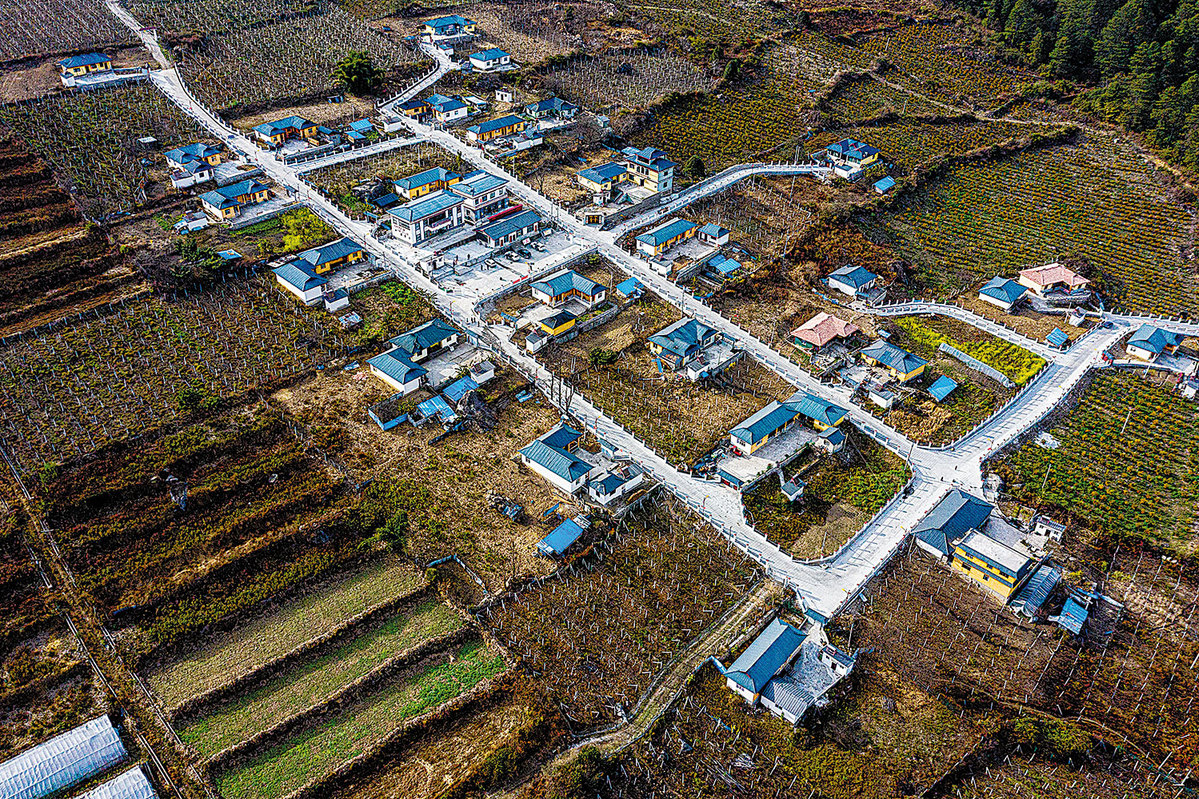
An aerial view of one of the villages in Zayul in January. [Photo by HE PENGLEI/CHINA NEWS SERVICE]
After studying the manufacturing process, he realized that all the ingredients grew in abundance in and around Thaling.
He quickly realized that the local flora gave his hometown a natural advantage in the manufacture of traditional incense.
"I saw that the economic development outside was very good. People in Lhasa could easily earn a lot of money. However, Thaling wasn't developed-the people worked very hard farming the land, but they couldn't earn money," he said.
"I wanted to introduce the incense industry to the village so the residents could earn extra money during the slack season. In Nyemo, the manufacturers have to buy all the raw materials from outside, but we are self-sufficient."
In Nyemo, he learned the manufacturing process from scratch in three months, and he taught the techniques to his village peers when he returned home. He also invited experts from the county to visit Thaling and provide one-on-one instruction.
The cooperative generates income of more than 100,000 yuan every year.
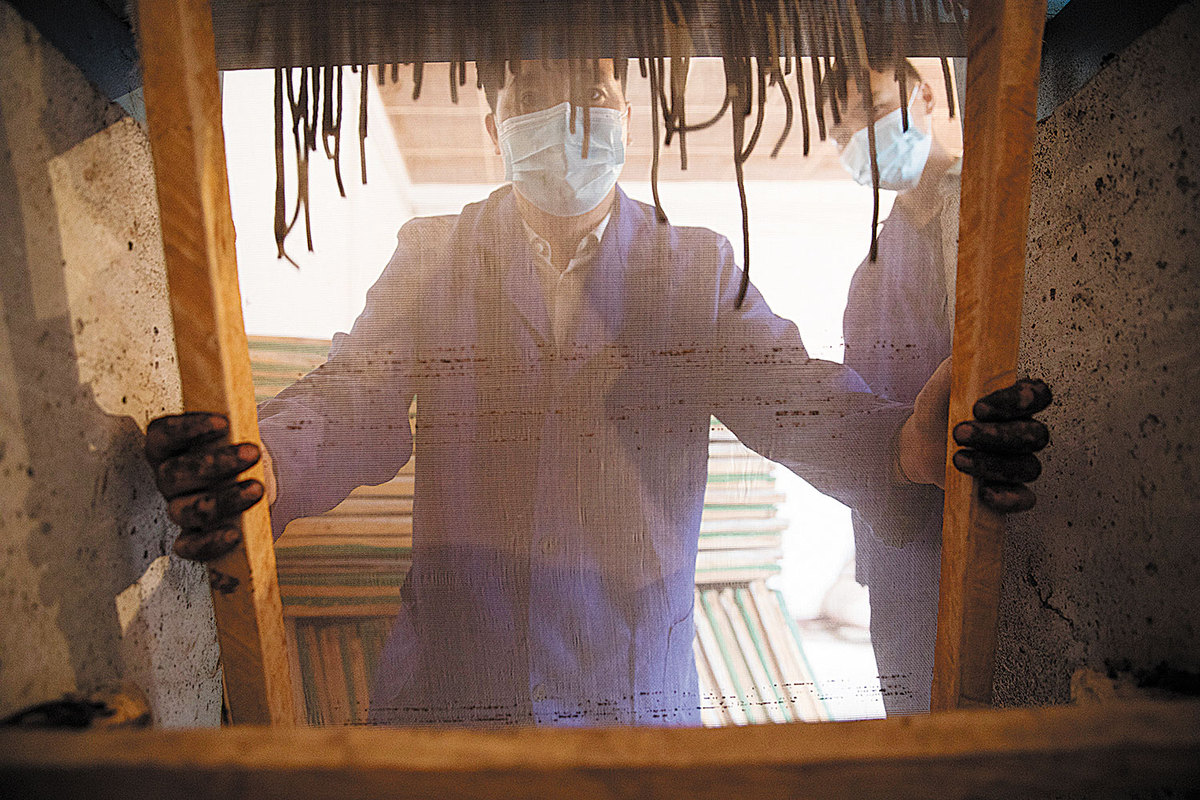
Tsering Wangdrak makes Tibetan incense at a workshop in Thaling village, Zayul county, Tibet autonomous region, last month. [Photo by JIN LIWANG/XINHUA]
Tsering Wangdrak said the sales figures are very promising. He has a relative in Lhasa who helps with sales in the capital, and many villagers have mobilized family members and friends to promote the product on social media.
Students from the village who attend universities outside Tibet also take packs of the incense with them when they return to school after vacations, and the exotic product has attracted many fans in other provinces and regions. The packs are labeled with an address and contact details, and customers can easily place orders by scanning a QR code.
Tsering Wangdrak now mainly uses the networks he has built around himself to promote and sell the incense. Meanwhile, Tsowang Drolma is helping him open an online store.
He has bought new machinery to expand production and hopes to become proficient at livestreaming as well someday.
"My Mandarin is not good, so livestreaming is still difficult for me. But the online store is already under construction," he said.








